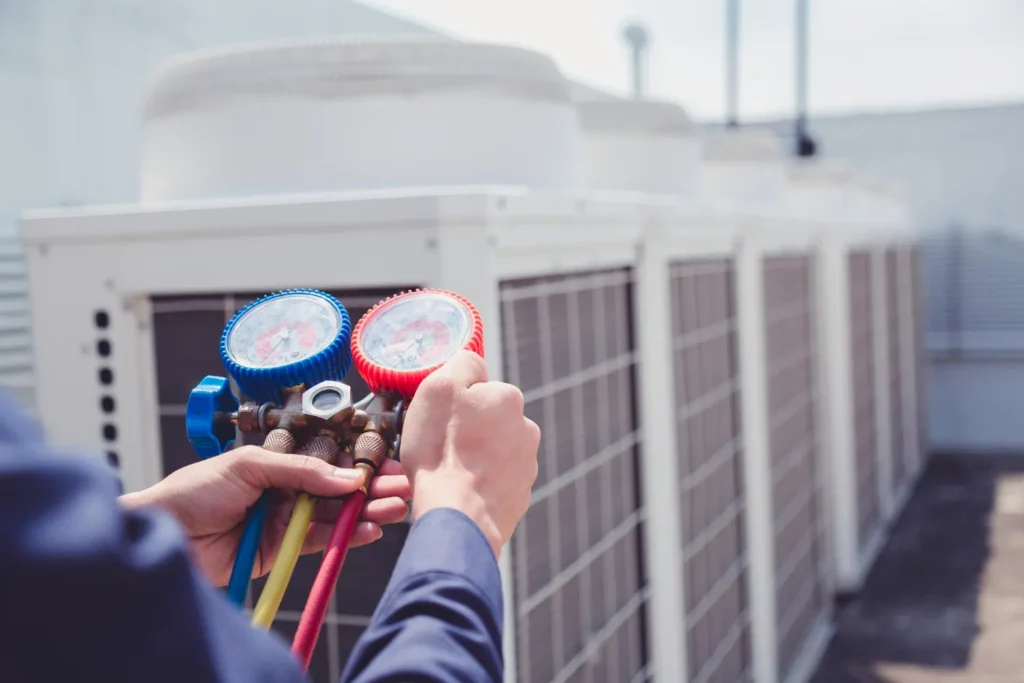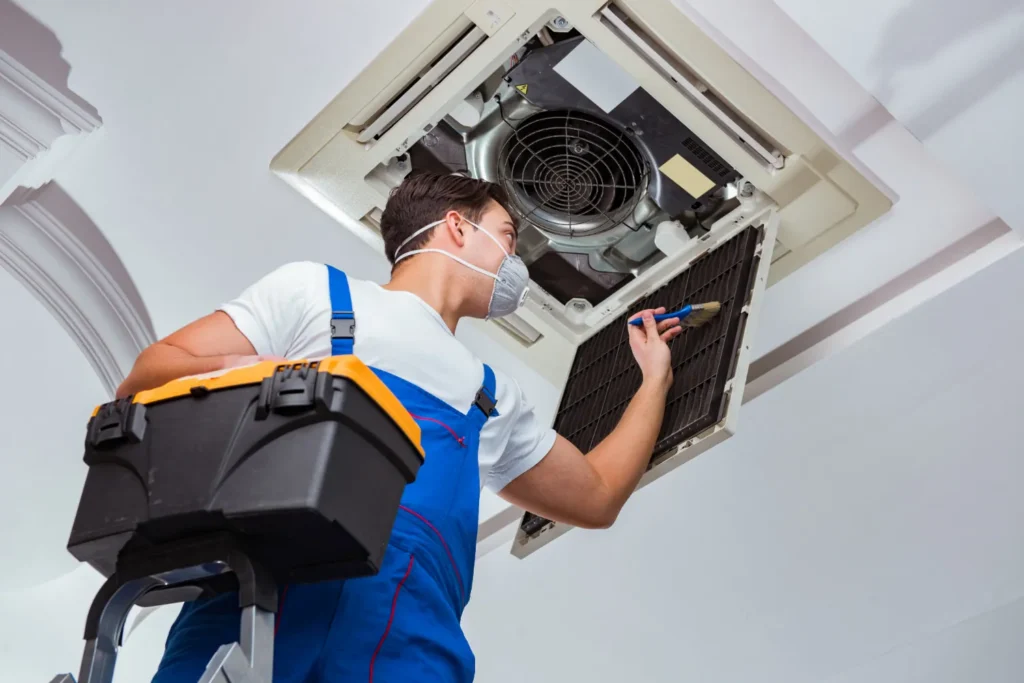When it comes to home comfort hot and humid climate, choosing the right ac unit isn’t just a luxury; it’s a necessity. A suitable AC unit affects not only your comfort and health but also your wallet. Efficient air conditioners can drastically reduce energy bills, maintain better air quality, and provide a more comfortable living environment.
In this article, we’ll explore the top features you should consider when selecting a new AC unit. Whether you’re replacing an old model or installing for the first time, understanding these features will ensure you make an informed decision that balances performance, efficiency, and cost.
Table of Contents
Energy Efficiency Ratings: Understanding SEER and EER

Energy efficiency is one of the most crucial considerations when purchasing a new AC unit, especially in areas, where the AC runs almost year-round. The Seasonal Energy Efficiency Ratio (SEER) and Energy Efficiency Ratio (EER) measure how much cooling an AC unit delivers per watt of electricity.
Understanding SEER: Efficiency Across the Season
Air conditioners work hard, especially in hot climates. Seasonal Energy Efficiency Ratio (SEER) helps you choose the suitable unit for year-round cooling. SEER considers how efficiently your AC cools at various temperatures throughout the season, giving you a more realistic picture of energy use.
EER: Efficiency at a Single Point
While SEER considers seasonal variations, Energy Efficiency Ratio (EER) focuses on a specific temperature. This is helpful for understanding peak performance but doesn’t account for seasonal fluctuations.
Higher SEER & EER = Lower Bills & Environmental Impact
Simple math: higher SEER and EER ratings mean your AC uses less energy to deliver the same cooling power. This translates to lower electricity bills and a smaller environmental footprint. Look for units with a SEER rating of 14 or higher – the current minimum standard – with even higher ratings offering even greater savings.
ENERGY STAR Certification: The Efficiency Champion
Look for the ENERGY STAR® label! These units meet strict efficiency guidelines set by the U.S. Environmental Protection Agency. Choosing a high SEER/EER, ENERGY STAR-certified AC can save you up to 20% on annual cooling costs, keeping you cool and comfortable while saving money and helping the planet.
Size and Capacity: Finding the Perfect Fit for Your Space
Sizing is critical when selecting a new AC unit. Too large an air conditioner will cool quickly but inefficiently, leading to frequent on-off cycles that can wear down the compressor. On the other hand, a unit too small will need more support to cool adequately, leading to continuous operation and excessive energy use.
The capacity of an AC unit is measured in British Thermal Units (BTU), and the appropriate size depends on various factors, including square footage, ceiling height, window size, and insulation quality of the building. Additional considerations such as heat gain from appliances and the number of occupants must also be factored in.
A professional HVAC installer can perform a detailed load calculation to determine the ideal unit size, ensuring it is neither too big nor too small but perfectly matched to your home’s specifications.
Type of AC System: Which One Suits Your Needs?
The choice of AC system largely depends on your home’s layout and your specific cooling needs. Common types include:
- Central Air Conditioning is ideal for cooling multiple rooms or the entire house. This system requires a network of ducts to distribute cool air efficiently.
- Ductless Mini-Splits are perfect for homes without ductwork. These systems consist of an outdoor compressor and one or more indoor air handling units, providing targeted cooling to specific areas.
- Window Units are suitable for cooling single rooms. They are easy to install and relatively inexpensive, but they can be noisy and visually obtrusive.
- Portable Air Conditioners: These stand-alone units can be moved from room to room and are ideal for situations where window configurations prevent the installation of window units.
- Each system has its pros and cons, and the right choice depends on your home’s specific requirements, budget, and existing infrastructure.
Advanced Features and Technologies: Enhancing Comfort and Convenience
Modern AC units come equipped with advanced features that enhance comfort, increase efficiency, and make operation easier. Key features to look for include:
- Variable-speed motors adjust the flow of air to maintain consistent temperatures throughout your home, improving comfort and reducing energy consumption.
- Smart Thermostats: These can learn your preferences and adjust the temperature automatically, besides being controllable remotely via smartphone.
- Zoning Systems: This allows you to cool different parts of your home to various temperatures, providing customized comfort and further improving energy efficiency.
- Such features not only make your AC unit more effective but also add to the overall user experience, providing both tangible and intangible benefits.
Noise Level: Keeping it Quiet

Peace is essential for a comfortable home, especially in your bedroom or relaxation areas. An air conditioner’s operational noise can disrupt that tranquility. This guide will help you navigate the world of AC noise levels and find a unit that keeps you cool without the racket.
Understanding Decibels (dB): Your Guide to AC Noise
The volume of your AC unit is measured in decibels (dB). Just like with headphones or speakers, lower dB ratings indicate a quieter machine. Modern high-efficiency ACs are designed with noise reduction in mind, typically operating between 50 and 60 dB – comparable to a conversation or a calm rainfall.
Finding the Perfect Balance: Noise Level vs. Efficiency
While shopping for a new AC unit, compare noise levels alongside efficiency ratings. Aim for a balance between these two factors. Many models prioritize quiet operation, making them ideal for noise-sensitive areas. This guide will help you find the perfect AC unit for excellent comfort and quiet enjoyment.
Air Quality Features: Ensuring Healthy Indoor Air
In today’s environment, indoor air quality is more important than ever, especially for families with allergies or respiratory issues. Many modern AC units come with features that improve indoor air quality, such as:
- HEPA Filters: These can trap fine particles like pollen, dust mites, and tobacco smoke.
- Built-In Air Purifiers: Some models come with integrated air purifiers to remove contaminants from the air.
- Humidity Control: In humid climates, controlling humidity is as important as cooling the air. Look for units with built-in dehumidifiers.
- These features ensure that the air in your home is cool, clean, and healthy, enhancing the overall living environment.
Warranty and Support: Securing Your Investment
A good warranty can protect your investment and provide peace of mind. When purchasing a new AC unit, look for long-term warranties that cover significant components like the compressor and other critical parts. Additionally, check the manufacturer’s and installer’s support services; reliable customer support can significantly ease the maintenance and repair process.
A comprehensive warranty coupled with excellent customer support ensures that any issues you encounter with your new AC unit are resolved quickly and efficiently without significant out-of-pocket expenses.
Conclusion – Choosing the Right AC Unit
Choosing the suitable AC unit involves careful consideration of many factors, including efficiency ratings, size, type, advanced features, noise level, air quality, and warranty. By taking the time to understand each of these aspects, you can make a well-informed decision that meets your specific needs and enhances your home comfort.
Ready to enjoy the comfort of a new air conditioner tailored to your home? Contact us today to schedule a consultation. Our experienced professionals will help you find the perfect AC unit that fits your space, meets your needs, and aligns with your budget. Leverage our expertise to ensure your home stays cool, comfortable, and energy-efficient.
FAQs About Choosing the Right AC Unit
My AC needs to be updated and more efficient. How much can I save by upgrading?
Modern high-efficiency AC units can significantly reduce your energy bills. Look for units with high SEER and EER ratings alongside ENERGY STAR certification. These features can lead to savings of up to 20% on annual cooling costs.
I need clarification about AC size. What happens if I get the wrong size?
An improperly sized AC unit can be a big headache. A unit that’s too large will short-cycle, waste energy, and reduce comfort. A unit that’s too small will need to be more significant to keep your home cool and running constantly, which will also drive up energy costs. A professional HVAC technician can perform a load calculation to ensure you get the perfect size unit for your home.
Window AC vs Central AC vs Ductless Mini-Split – what’s the right choice for me?
The ideal AC system depends on your home’s layout and needs. Central AC cools the whole house but requires existing ductwork. Ductless mini-splits are perfect for targeted cooling in specific areas or homes without ducts. Window units are a budget-friendly option for single rooms but can be noisy and inefficient.
How important is noise level when choosing an AC unit?
A quiet AC unit is essential for a peaceful home, especially in bedrooms. Look for units with decibel (dB) ratings around 50, which is comparable to a conversation. Many modern ACs prioritize quiet operation.
What features can improve my indoor air quality?
Many AC units offer features that enhance indoor air quality. HEPA filters trap allergens and dust particles, while built-in air purifiers remove contaminants. In humid climates, units with dehumidifiers help control moisture levels.




